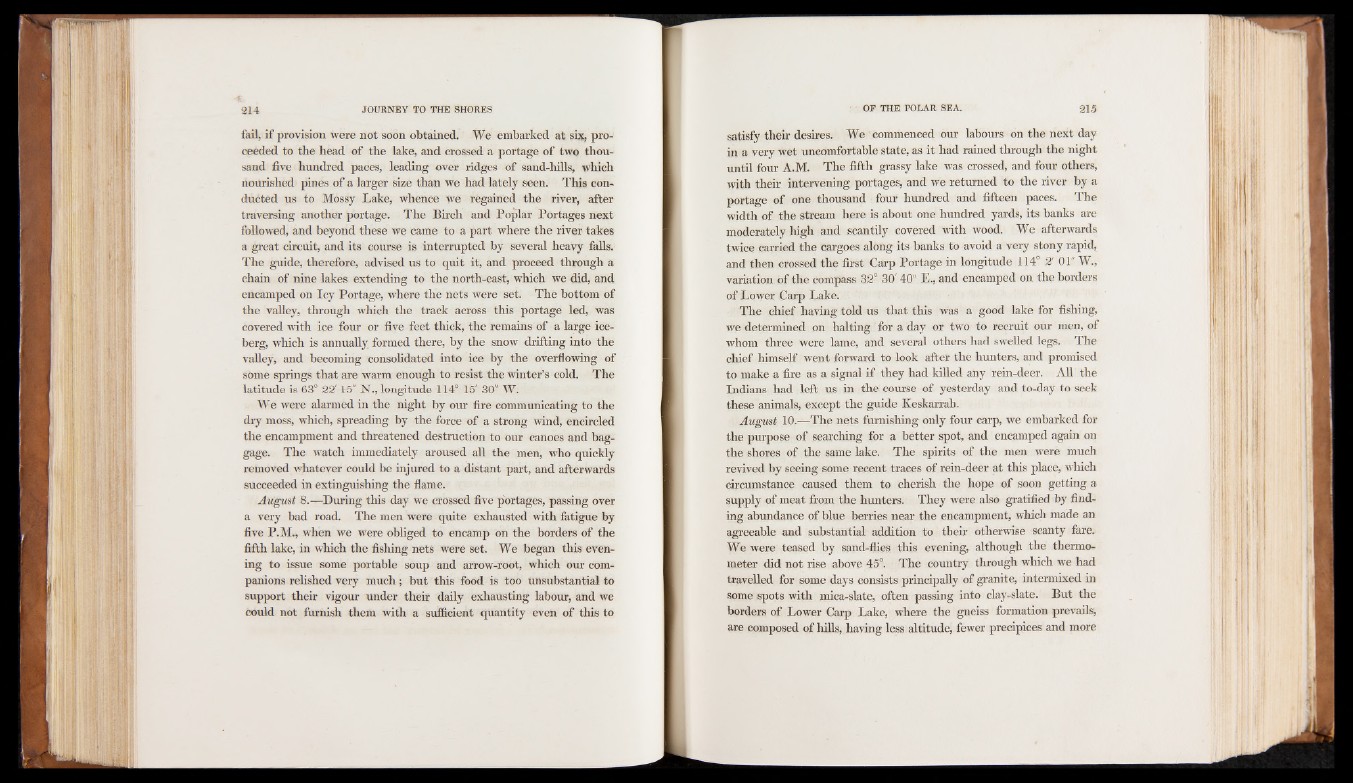
fail, if provision were not soon obtained. We embarked at six, proceeded
to the head of the lake, and crossed a portage of two thousand
five hundred paces, leading over ridges of sand-hills, which
nourished pines of a larger size than we had lately seen. This conducted
us to Mossy Lake, whence we regained the river, after
traversing another portage. The Birch and Poplar Portages next
followed, and beyond these we came to a part where the river takes
a great circuit, and its course is interrupted by several heavy falls.
The guide, therefore, advised us to quit it, and proceed through a
chain of nine lakes extending to the north-east, which we did, and
encamped on Icy Portage, where the nets were set. Thé bottom of
the valley, through which the track across this portage led, was
covered with ice four or five feet thick, the remains of a large iceberg,
which is annually, formed there, by the snow drifting into the
valley, and becoming consolidated into ice by the overflowing of
some springs that are warm enough to resist the winter’s cold. The
latitude is 63° 22' t5" N., longitude 114° 15' 30“ W.
We were alarmed in the night by our fire communicating to the
dry moss, which, spreading by the force of a strong wind, encircled
the encampment and threatened destruction to our canoes and baggage.
The watch immediately aroused all the men, who quickly
removed whatever could be injured to a distant part, and afterwards
succeeded in extinguishing the flame.
August 8.—During this day we crossed five portages, passing over
a very bad road. The men were quite exhausted with fatigue by
five P.M., when we were obliged to encamp on the borders of the
fifth lake, in which the fishing nets were set. We began this evening
to issue some portable soup and arrow-root, which our companions
relished very much; but this food is too unsubstantial to
support their vigour under their daily exhausting labour, and we
could not furnish them with a sufficient quantity even of this to
satisfy their desires. We commenced our labours on the next day
in a very wet uncomfortable state, as it had rained through the night
until four A.M. The fifth grassy lake was crossed, and four others,
with their intervening portages, and we returned to the river by a
portage of one thousand four hundred and fifteen paces. The
width of the stream here is about one hundred yards, its banks are
moderately high and scantily covered with wood. We afterwards
twice carried the cargoes along its banks to avoid a very stony rapid,
and then crossed the first: Carp Portage in longitude 114° 2' 01" W.,
variation of the compass 32° 30' 40" E., and encamped on the borders
of Lower Carp Lake.
The chief having told us that this was a good lake for fishing,
we determined on halting for a day or two to recruit our men, of
whom three were lame, and several others had swelled legs. The
chief himself went forward to look after the hunters, and promised
to make a fire as a signal if they had killed any rein-deer. All the
Indians had left us in the course of yesterday and to-day to seek
these animals, except the guide Keskarrah.
August 10.—The nets furnishing only four carp, we embarked for
the purpose of searching for a better spot, and encamped again on
the shores of the same lake. The spirits of the men were much
revived by seeing some recent traces of rein-deer at this place, which
circumstance caused them to cherish the hope of soon getting a
supply of meat from the hunters. They were also gratified by finding
abundance of blue berries near the encampment, which made an
agreeable and substantial addition to their otherwise scanty fare.
We were teased by sand-flies this evening, although the thermometer
did not rise above 45°. The country through which we had
travelled for some days consists principally of granite, intermixed in
some spots with mica-slate, often passing into clay-slate. But the
borders of Lower Carp Lake, where the gneiss formation prevails,
are composed of hills, having less altitude, fewer precipices and more